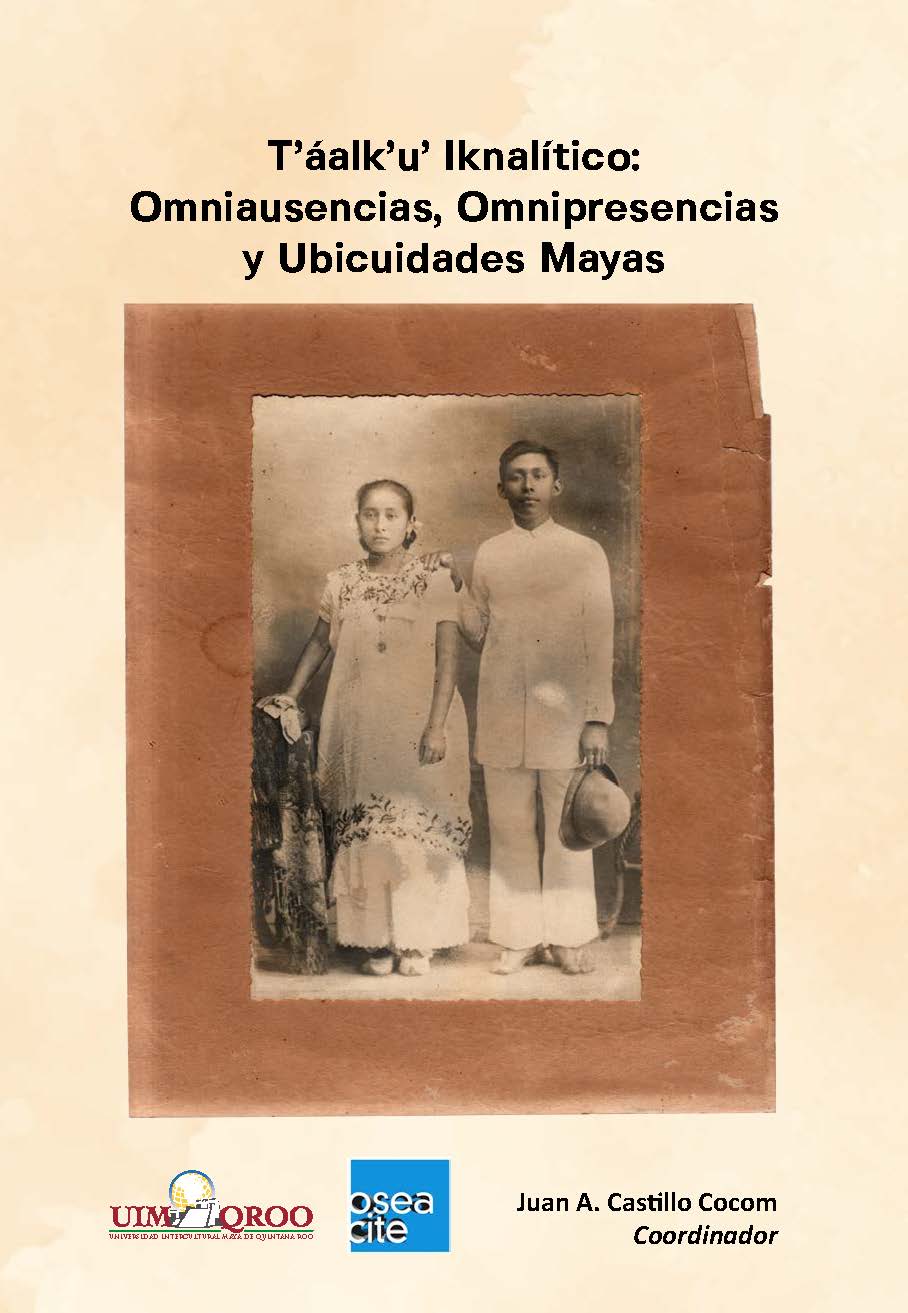
ISBN
Formato impreso
978-607-8964-04-8
Formato digital
978-84-10215-02-3
Fecha de publicación
Formato impreso
15-03-2024
Formato digital
04-03-2024
Licencia
© D. R. Universidad Intercultural Maya de Quintana Roo. Carretera Muna-Felipe Carrillo Puerto Km. 137, S/N. Presumida, Municipio de José María Morelos, Quintana Roo, C. P. 77870.
Sarah Bey West
Northwestern University
0009-0004-2873-4097
Acerca de
Este capítulo ofrece algunas reflexiones sobre de la novela bilingüe de Georgina Rosado y Carlos Chablé, En busca de María Uicab: Reina y Santa Patrona de los mayas rebeldes / Ich u k’aaxantil María Uicab (2021), reflexiones guiadas por la meta de proponer una exploración de género en la memoria de la (mal) llamada Guerra de Castas, el levantamiento más largo y exitoso de este hemisferio. Este capítulo ofrece una definición del género como una estructura colonizante y demuestra la importancia del abandono del binario de género —es decir, la articulación de hombre y mujer, o lo que se ha llamado posiciones de cisgénero— en el imaginario de mundos decoloniales. De ahí, considero el impacto que el género estructural tiene en la memoria de la Guerra de Castas a través de la yuxtaposición del trabajo antropológico sobre Uicab y novela de Rosado y Chablé.
Le ts’íiba’ ku k’ubik wa jayp’eel taamkach tuukulo’ob yo’osal u popolts’íibil Georgina Rosado yéetel Carlos Chablé, En busca de María Uicab: Reina y Santa Patrona de los mayas rebeldes / Ich u k’aaxantil María Uicab (2021), tuukulo’ob belbesa’an uti’al u xaak’alxokta’al ti’ xch’uup yéetel xiib ichil u k’a’ajbesajil le ma’ enaj u k’aba’ta’al u “Ba’atelil le Ch’i’ibalo’obo’”, u li’ik’ilba’atelil mas xanchajij ichil u náajatbilil way te tu jaatsillu’um yóok’ol kaabe’. Le múuch’ ts’íiba’, ku jets’ik género bey jump’éel tsoolilba’il u ti’al táanxel tu’ux -u k’áat u ya’ale’, le u p’a’at-tukulta’al máako’ob chéen je’ebix ch’uupo’ob wa chéen je’exbix xiibo’ob (cisgénero)- tu tuukulo’ob múuch’ kaajo’ob táanxelilo’ob. Te’elo’, kin máansik tukultbil bix u tak’bentubaj genero estructural ichil u k’a’ajbesajil u Ba’atelil le Ch’i’ibalo’obo’ tu’ux ku nupbesikubáaj u xaak’alxokta’al yóok’lal Uicab yéetel u u popolts’íibil Rosado yéetel Chable’.
Referencias
Aizura, Aren Z. 2006. “Of Borders and Homes: The Imaginary Community of (Trans)Sexual Citizenship 1.” Inter-Asia Cultural Studies 7 (2): 289–309. https://doi.org/10.1080/14649370600673953.
Bey, Marquis. 2022. Black Trans Feminism. Duke.
Campbell, Timothy C., and Adam Sitze, eds. 2013. “Biopolitics: An Encounter.” In Biopolitics: A Reader. A John Hope Franklin Center Book. Durham London: Duke University Press.
Castillo Cocom, Juan A., and Quetzil E. Castañeda. 2021. “Visión etnográfica: Imaginar el iknal maya.” The Journal of Latin American and Caribbean Anthropology 26 (1): 10–24. https://doi.org/10.1111/jlca.12543.
Colón, Cristóbal. 2007. Los Cuatro Viajes. Testamento. Edited by Consuelo Varela. Alianza Editorial.
Espinosa Miñoso, Yuderkys, Diana Gómez Correal, and Karina Ochoa Muñoz. 2014. Tejiendo de “Otro Modo”: Feminismo, Epistemología y Apuestas Decoloniales En Abya Yala. Popayán, Colombia: Universidad de Cauca.
Huanacuni, Fernando. 2010. Buen vivir, vivir bien: filosofía, políticas, estrategias y experiencias regionales andinas. Coordinadora Andina de Organizaciones Indígenas.
Índice Peninsular. 2020. “Presentan ‘En Busca de María Uicab’, Libro Sobre La Sacerdotisa Maya de Tulum – Georgina Rosado y Carlos Chablé, Sus Autores.” November 4, 2020. https://www.facebook.com/indicemaya/photos/a.1149928971817967/2172435472900640/?paipv=0&eav=AfaWomEDsjmHqX9BsSkVzMKfdv1g3zu4V_1JVZhifwY3Zn-RXN7wYHJPcDXglHuUv3Q.
Leo, Brooklyn. 2020. “The Colonial/Modern [Cis]Gender System and Trans World Traveling.” Hypatia 35 (3): 454–74. https://doi.org/10.1017/hyp.2020.27.
Lugones, Maria. 2016. “The Coloniality of Gender.” In The Palgrave Handbook of Gender and Development, edited by Wendy Harcourt, 13–33. London: Palgrave Macmillan UK. https://doi.org/10.1007/978-1-137-38273-3_2.
Marcos, Silvia. 2017. Cruzando Fronteras: Mujeres Indígenas y Feminismos Abajo y La Izquierda. Chile: Editorial Quimantú.
Mcclintock, Anne. 1995. Imperial Leather: Race, Gender, and Sexuality in the Colonial Contest. New York: Routledge. https://doi.org/10.4324/9780203699546.
Quijano, Aníbal. 2000. “Coloniality of Power, Eurocentrism, and Latin America.” In Neptantla: Views from the South, 533–80. Duke University Press.
Reed, Nelson. 1964. The Caste War of Yucatan. Palo Alto: Stanford University Press.
Riley, Denise. 1988. “Am I That Name?”: Feminism and the Category of ‘Women’ in History. U of Minnesota P.
Rosado, Georgina, and Carlos Chablé. 2020. En Busca de María Uicab: Reina y Santa Patrona de Los Mayas Rebeldes. Cuautitlán, México: Ediciones El nido del fénix.
Rosado Rosado, Georgina, and Landy Santana Rivas. 2008. “María Uicab: Reina Sacerdotisa y jefa militar de los mayas rebeldes de Yucatán (1863-1875).” Mesoamérica 29 (50): 112–39.
Rugeley, Terry. 2009. Rebellion Now and Forever: Mayas, Hispanics, and Caste War Violence in Yucatán, 1800-1880. Stanford, Calif: Stanford University Press.
Salamon, Gayle. 2010. Assuming a Body: Transgender and Rhetorics of Materiality. Columbia University Press.
Santana Rivas, Landy. 2003. “La construcción del género en la cultura maya.” Revista de la Universidad Autónoma de Yucatán, no. 225.
Segato, Rita Laura. 2014. “Colonialidad y Patriarcado Moderno: Expansión Del Frente Estatal, Modernización, y La Vida de Las Mujeres.” In Tejiendo de “Otro Modo”: Feminismo, Epistemología y Apuestas Decoloniales En Abya Yala, edited by Yuderkys Espinosa Miñoso, Diana Gómez Correal, and Karina Ochoa Muñoz. Popayán, Colombia: Universidad de Cauca.
Spillers, Hortense J. 1987. “Mama’s Baby, Papa’s Maybe: An American Grammar Book.” Diacritics 17 (2): 65–81. https://doi.org/10.2307/464747.
Walsh, Catherine. 2007. “SHIFTING THE GEOPOLITICS OF CRITICAL KNOWLEDGE: Decolonial Thought and Cultural Studies ‘Others’ in the Andes.” Cultural Studies 21 (2–3): 224–39. https://doi.org/10.1080/09502380601162530.
———. 2012. “‘Other’ Knowledges, ‘Other’ Critiques: Reflections on the Politics and Practices of Philosophy and Decoloniality in the ‘Other’ America.” TRANSMODERNITY: Journal of Peripheral Cultural Production of the Luso-Hispanic World 1 (3). https://doi.org/10.5070/T413012880.
Wynter, Sylvia. 2003. “Unsettling the Coloniality of Being/Power/Truth/Freedom: Towards the Human, After Man, Its Overrepresentation–An Argument.” CR: The New Centennial Review 3 (3): 257–337. https://doi.org/10.1353/ncr.2004.0015.
Zambrini, Laura. 2014. “Diálogos entre el feminismo postestructuralista y la teoría de la interseccionalidad de los géneros.” Revista Punto Género, no. 4: ág. 43-54. https://doi.org/10.5354/2735-7473.2014.36408.
